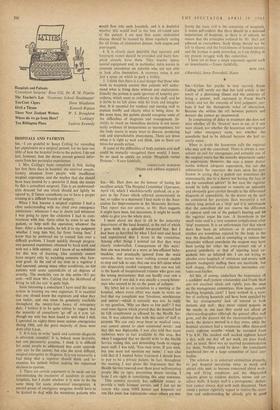SIR, — Mr. Hart does me the honour of basing his excellent
article 'The Hospital Committee' (Spectator, April 14), which I wholeheartedly applaud, on a re-
port in the Times which referred anonymously to me, or rather to a statement I had made to the Asso- ciation for Improvements in the Maternity Services. That report was not untrue, as Mr. Hart suggests it might have been, but inaccurate. It might be worth while to give you the whole story.
I spent about ten days in all in the maternity department of the local hospital, at the end of which I gave birth to a splendid ten-pound boy. But I had been so horrified by what I had seen and beard and experienced that I wrote to the committee. Among other things I pointed out that they were clearly understaffed. Consequences of this were: that one was treated as a more or less efficient baby- machine, and practically ignored from the waist upwards; that nurses were rushing around unable to stop and talk to one; that one was left alone when one desperately needed company; that one was left in the hands of inexperienced trainees who gave one the wrong instructions; thit one hardly ever saw a doctor, and if one did, it was usually a young house- man who seemed to be on the point of collapse.
My letter led to an invitation to a meeting at the hospital, where every effort was made to make me feel that my complaint was 'frivolous, mischievous and untrue'—which it certainly was not. In reply to my question, 'Why are there so few staff?' I was read some figures which proved that the hospital had its full complement as allowed by the Health Ser- vice. It was admitted that with this ratio of staff to patients 'We can only treat them as medical cases, and cannot attend to their emotional needs•,' and that this was deplorable. I was also told that more midwives were in fact available in this area. But when I suggested that we should write to the Health Service stating this, and demanding funds to engage more staff, I was told, 'You may write, if you wish, but you must not mention my name.' I was also told that if I wanted better treatment I should have to pay to be a private patient. In fact, throughout the meeting I was given the impression that the Health Service towered over these poor well-meaning people like an ogre, preventing decent nursing. I hope I am• right in considering this utter nonsense.
This country certainly has sufficient money to provide a truly humane service, and I can see no reason why some NHS homes and hospitals are run like poor law institutions—since others arc not. Surely the basic evil is the autonomy of hospitals. It seems self-evident that there should be a national inspectorate of hospitals, as there is. of schools, to ensure that the principles outlined by Mr. Hart are adhered to everywhere. Such things should not he left to chance and the freakishness of human nature; and the layman is quite powerless, as I am finding in my present struggle with this committee.
I have yet to hear a single argument against such an inspectorate.—Yours faithfully, 4 Barn field, Steep. Petersfield. Hants RENE GILL














































 Previous page
Previous page